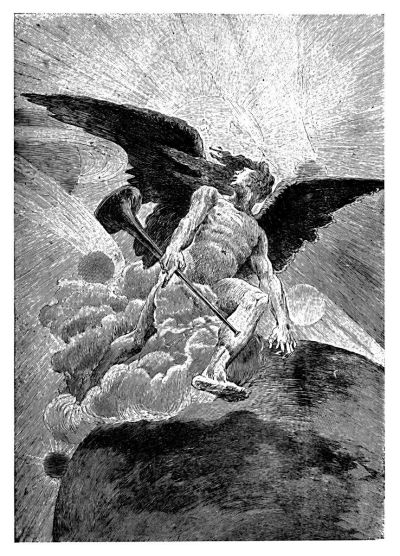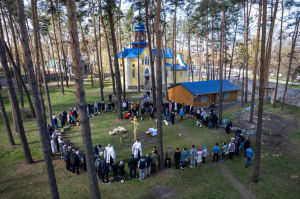Revelation 14: A third angel and the distinction of the ages

In today’s Western culture, the word “diversity” is referred to as a social value that people are
encouraged to laud and celebrate. There is racial/ethnic diversity, so-called gender diversity,
LGBTQ+ diversity, disability diversity, religious diversity, socioeconomic diversity, age
diversity, cultural diversity, and linguistic diversity. This is not an exhaustive list. There are
other forms of diversity people are expected to applaud. However, when it comes down to
brass tacks, in God’s economy, there are only two categories of people: saints and sinners,
the redeemed and the unredeemed, the righteous and the unrighteous, the pure and the
impure, the moral and the immoral, the saved and the unsaved.
This two-fold differentiation is seen throughout the Scriptures from Genesis to Revelation.
For instance, the line of Seth, which represented a righteous line of people, was
differentiated from the line of Cain, whose descendants spread sin and intolerable levels of
violence.
In the story of Noah’s Ark and the universal flood of God’s rage against gross worldwide sin,
Noah and his family were counted righteous, while the rest of the world was condemned
(Genesis 6-9).
In the account of Sodom and Gomorrah (Genesis 18-19), Lot, the nephew of Abraham, is
seen as a believer living in wicked Sodom. 2 Peter chapter 2 verse 7 says Lot was a
righteous man distressed by the conduct of the lawless. Separated from the evil people of
Sodom, Lot was rescued by angels before God rained down his fiery judgment on the cities.
Throughout the Old Testament, there is a distinction between the chosen of Israel, who were
expected to keep God’s covenant and law, and the Gentile nations who engaged in idolatry
and immoral practices.
During the period of Israel’s captivity in Babylon, the righteous Israelites were divided from
the unrighteous. Daniel and his friends were faithful and separated from God in that pagan
city.
In the New Testament, Jesus tells a parable about a farmer who sowed wheat in his field, but
an enemy came later and sowed weeds among the wheat (Matthew 13:24-30). When
harvest time arrived (a symbol of judgment), the wheat (symbolizing the righteous) was
separated from the weeds (symbolizing the unrighteous).
In another parable, Jesus talked about sheep and goats being differentiated and placed into
two different categories or groups. The parable illustrates a future judgment where the
righteous (the sheep) are divided from the unrighteous (the goats).
On another occasion, Jesus talked with Nicodemus, a religious leader of his day, about
those born of the flesh and those born again of the Spirit of God (John 3:1-18).
There is still one other striking text in the New Testament that contrasts these two groups of
people. In John’s Gospel chapter 8, Jesus speaks about the children of God as opposed to
the children of the devil.
In his commentary on The Sermon on the Mount, the late Dr. James Montgomery Boice,
former senior pastor of the Tenth Presbyterian Church in Philadelphia, explained this
distinction.
Boice wrote:
“In the eighth chapter of John we are told that Jesus had been teaching in Jerusalem and had made the statement, ‘Then you will know the truth, and the truth will set you free’ (v.32). The Jews answered him, ‘We are Abraham’s descendants and have never been slaves of anyone. How can you say that we shall be set free?’ (v.33). ‘I know you are Abraham’s descendants,’ Jesus responded, ‘Yet you are ready to kill me…If you were Abraham’s children,…then you would do the things that Abraham did’ (vv. 37,39). At this point, the people grew angry and accused him of being illegitimate. In righteous anger, the Lord
replied, ‘If God were your Father, you would love me, for I am from God and now am here. I have not come on my own, but he sent me. Why is my language not clear to you? Because you are unable to hear what I say. You belong to your father, the devil, and you want to carry out your father’s desire’ (vv.42-44). Thus, he [Jesus] put to an end forever the misleading and totally devilish doctrine that God is the father of all men and that all men are his children.
“Let us submit to the Word of God, and let the truth of the Word sweep the mind clean of all such false ideas. There are two families and two fatherhoods in this world. There is the family of Adam, into which all men are born, and there is the family of God, into which some men are reborn by faith in the Lord Jesus Christ. These latter were once the children of darkness; they are now children of light (Ephesians 5:8). They were dead in trespasses and sins; they are now alive in Christ (Ephesians 2:1). They were once children of wrath and disobedience; they are now children of love, faith, and obedience (Ephesians 2:2-3). These
are God’s children. These and only these can approach God as their Father.”
How interesting that when one reaches the description of the last dispensation of humanity in
Revelation, two types of people are referenced again. This time, however, they are signified
as “anyone who worships the beast” and “God’s holy people.”
In Revelation 14, it says the first angel preached the everlasting Gospel. The second angel
announced Babylon had fallen. In verses 9 through 13, it says a third angel comes into the
picture and shouts a warning based on the distinction of the ages.
This is what the Bible says:
“Then a third angel followed them, shouting, ‘Anyone who worships the beast and his statue
or who accepts his mark on the forehead or on the hand must drink the wine of God’s anger.
It has been poured full strength into God’s cup of wrath. And they will be tormented with fire
and burning sulfur in the presence of the holy angels and the Lamb. The smoke of their
torment will rise forever and ever, and they will have no relief day or night, for they have
worshiped the beast and his statue and have accepted the mark of his name.’
“This means that God’s holy people must endure persecution patiently, obeying his
commands and maintaining their faith in Jesus.
“And I heard a voice from heaven saying, ‘Write this down: Blessed are those who die in the
Lord from now on. Yes, says the Spirit, they are blessed indeed, for they will rest from their
hard work; for their good deeds follow them!’” (Revelation 14:9-13)
This passage from Revelation is certainly not for the faint of heart because it speaks
demonstrably about God’s wrath and his sending people to hell.
Not long ago, I came upon several old issues of The Sunday School Times, at an antique
store. The Times was a very popular periodical published in the United States from 1859-
1966. It was primarily focused on providing religious and educational content for Christian
Sunday School teachers, administrators, and students. In a November 1944 edition, an
unnamed author wrote:
“‘Hell’ is exceedingly popular as an expletive or swear word, but quite unpopular as a reality. It would seem to be one of the multifarious devices of the devil to get men to use the word in anger or jest, and to forget there is such a place.”
Indeed, there is a literal hell. It’s a place where the damned are imprisoned forever. It is
God’s universal trash bin, where the lives of those who refused God’s offer of grace and did
not live for his glory are thrown away.
A new Gallup Poll says belief in God, the devil, angels, heaven, and hell have fallen to a new
low. Specifically, 74 percent affirmed their belief in God, followed closely by 69 percent who
expressed belief in angels and 67 percent who shared belief in heaven. A slightly lower
portion, consisting of 59 percent and 58 percent, respectively, professed their belief in hell
and the devil. What’s alarming is belief in all five of these fell from 3 to 5 points just since
2016.
Nevertheless, refusing to believe in something doesn’t make it untrue. We can know hell is
real because the Bible teaches it exists.
There is no book in the world comparable to the Bible. Scholars and historians have proved
the reliability of its claims repeatedly through archaeological evidence and other historical
sources. Although it consists of numerous different books by different authors written
centuries apart, the internal consistency of its messages demonstrates its divine origin. Its
abundance of prophecies that are fulfilled with incredible accuracy demonstrate its holy
inspiration. Moreover, its unprecedented positive impact culturally, politically, and personally
show that every word of the Bible is from God, trustworthy and factual.
It’s also important to know that Jesus spoke more about hell than he did about heaven. Yes,
the mild and gentle Shepherd of Souls often spoke about the horrors of hell, saying it was a
place of weeping, wailing, gnashing of teeth (Matthew 13:40-43), darkness (Matthew 8:12;
22:13; 25:30), and a dimension in the underworld where the worm never dies (Matthew 9:43)
and the fire is never quenched (Revelation 20:14).
Hell is where the anger of an eternal God is poured out in full measure on those who by their
own volition chose to stay in their sins. Therefore, God leaves them in their unregenerate
state, and their self-centered rebellious hearts forever fuel the flames of God’s wrath.
How fearful! Jesus spoke often about hell because he wanted to shake us, frighten us, and
awaken us to hell’s dreadful terrors. Jesus spoke of hell because he wants us to be
redeemed and forgiven. He wants us to be converted and enjoy eternal life.
Alice Cooper, the iconic rockstar known for his provocative stage presence, underwent a
significant transformation in life a few years ago. In an interview with Pastor and Evangelist,
Greg Laurie, at the 2018 SoCal Harvest event, Cooper shared his reason for coming to
Christ. He stated his conversion was not solely based on knowing God loved him, but mostly
based on his fear of God and hell.
There is an adage which says, “Fear is the mother of caution.” In other words, fear can serve
as a warning to help us make wise decisions in potentially dangerous situations. Fear of
God’s wrath ought to be a good motivation for people to accept his offer of grace in Jesus
Christ, lest as unreconciled sinners they are sent to an eternal hell, where “the smoke of their
torment will rise forever and ever, and they will have no relief day or night.” What a harrowing
prospect!!!
Another tremendous truth to be drawn from Revelation 14, which is in verse 12, is that God’s
holy people have always had to suffer persecution from the ungodly. It will be this way until
the very end when Christ’s Kingdom is established for eternity.
The Bible says the pious young Joseph (a type of Christ) was despised by his impious
brothers and treacherously sold by them into slavery.
The Israelites while living in Egypt were oppressed and persecuted by the Egyptians for
more than four centuries, despite their righteousness. Pharoah even ordered the murder of
all the Hebrew male infants to keep their ranks from growing.
The prophet Elijah faithfully served God, but was maltreated by King Ahab and Queen
Jezebel. Elijah had to flee for his life and endured many hardships because of their
corruption.
The prophet Jeremiah was called a prophet to the nations but faced constant harassment,
imprisonment, and death threats at the hands of both Jews and Gentiles who sought to
suppress his faithful preaching of the Word of God.
The apostle Paul formerly known as Saul, himself, persecuted Christians before his
conversion to Christ. However, after embracing the Savior, he endured tremendous
hardships from Jews and Gentiles who opposed the Gospel message.
Jesus, of course, was the epitome of righteousness. Yet, he was unjustly accused,
condemned, and crucified by the authorities of his time.
The apostle Paul wrote in his letter to Timothy, something every Christian must understand,
he said:
“Yes, and everyone who wants to live a godly life in Christ Jesus will suffer persecution” (2 Timothy 2:12)
It’s not that the godly might suffer some form of persecution, it’s that they inevitably will. It is
the plight of the faithful.
Many years ago, my faithful pastor warned me, “If you never run up against the devil, it’s
likely you’re walking with him.”
Various forms of marginalization, isolation, rejection, hatred, and hostility experienced by
Christians are hallmarks of their saintly lives. Christians must learn to anticipate and expect
persecution, of greater or lesser intensity. Persecution is inevitable if the individual
professing to be a Christian has truly been transformed by Christ, if the Redeemer’s mark is
on his forehead. Therefore, God’s children must bear it patiently, never swerving in their
obedience or abandoning their faith in Christ, holding onto the promise that God is a
rewarder of those that diligently seek him (Hebrews 11:6).
How powerful is this contrast in Revelation where the lost and unsaved may only look
forward to eternal torment, but the saved may rejoice in their sufferings, knowing ahead of
them lies heaven and an eternal reward!?
Former Bible teacher for the Back to the Bible Broadcast, Warren Wiersbe, expounds in his
book, Be Victorious, that the apostle John is “warning that ‘the easy way’ is really the hard
way, that to ‘go along with the world’ means to go away from God…John intended for his
readers to see the contrast between verses 11 and 13: no rest for the wicked, but eternal
rest for the saints (see 2 Thessalonians 1:3-12). Better to reign with Christ forever than with
Antichrist for a few short years! Better to endure persecution patiently now than to escape it
and suffer throughout eternity!”
Perhaps it would be good to close with an additional distinction made by Boice. This one
comes from his commentary on The Gospel of John:
“There are two ways open before us. ‘There is a way which seemeth right unto a man, but the end thereof are the ways of death’ (Proverbs 14:12). This is Satan’s way. And there is a ‘way, which leadeth unto life’ (Matthew 7:14), which is God’s way. The two paths lie before each individual.
“On the one path, Satan makes his promises. But he is the father of lies, and his words cannot be trusted. He is offering wisdom, as he did to Eve in the Garden – ‘Ye shall be as God, knowing good and evil’ – but the wisdom of Satan leads to folly in spiritual things. He is offering love, but the end is hate. He is offering that which is pleasant – ‘all the kingdoms of this world and their glory’ – but the end is torment for those who follow him.
“On the other path stands Jesus with his promises. In one sense they are the reversal of Satan’s promises. He says, ‘You are blind!’ but he gives sight, and wisdom follows. He has a message of hate. ‘I hate sin,’ he declares. But he will turn you from sin and draw you to himself with great love. Finally, he warns about torment. He has more to say about hell than anyone in the Bible. But he offers pleasantness to those who follow him. All his ways are ‘pleasantness’ and all his ‘paths are peace’ (Proverbs 3:17). Will you follow him? Will you commit yourself to him as your Savior?”
Well, will you
Rev. Mark H. Creech is executive director of the Raleigh-based Christian Action League of North Carolina Inc.



























